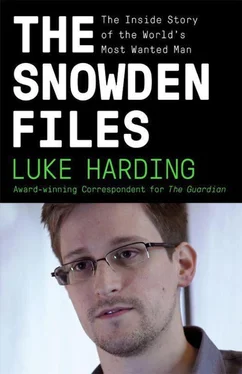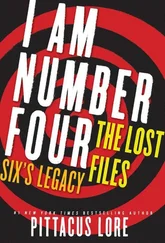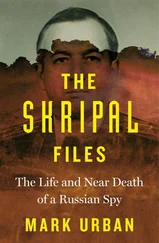Snowden was surrounded by spies dedicated to detecting hidden codes and patterns, to discovering secrets. If they discovered his, he would likely be quietly tried, convicted and jailed for decades, an anonymous geek who tried and failed to steal data from his employers. Little wonder Snowden appeared buttoned up.
Friends likened him teasingly to Edward Cullen, the vampire played by Robert Pattinson from the Twilight saga. Snowden was pale, enigmatic, solemn and seldom seen by day. He hardly ever appeared at social gatherings. ‘He would barely say anything and hang out on the side, sort of hovering. So it became a sort of game to involve him, like “Go Team Edward!”’ recalls one. ‘At a birthday party one night we prodded him into making an actual speech. It was about five words.’
Snowden did describe his life in Hawaii as ‘paradise’. This, certainly, was how the Honolulu Star-Advertiser also tells it, declaring on its masthead: ‘The pulse of paradise.’ What passed for news headlines – ‘Officials contemplate weekend harbor hours’, ‘Pacific aviation museum honors daredevil’, ‘Bush blaze doused on Maui’ – tended to boost the image of a tropical idyll.
But for Snowden there were few outwards signs of fun. No surfing, no golf, no lounging on the beach. ‘He was pale, pale, pale, pale, as if he never got out in the sun,’ the friend says. (In contrast, Barack Obama, who has a sister on Oahu, gives every impression of savouring the beaches, the surf and the shave ice, the local version of a snow cone.)
Compared to Snowden, glued to his laptops, his partner Lindsay Mills was a social butterfly. After arriving in Hawaii she joined Pamela and the Pole Kats, a group that trained and performed using poles. It was not stripping – they did athletic performances at the Mercury, a hipster bar in downtown Honolulu, once a month. Mills also participated in street performances on the first Friday of each month.
Despite her outward sociability, though, Mills remained a puzzle to some acquaintances in Hawaii. She half-hid behind huge sunglasses. She did not volunteer much personal information. Many were unaware she even had a boyfriend. She didn’t appear to have a job – that is, beyond her photography and dancing – yet drove a new SUV. The source of her prosperity was another riddle.
Pam Parkinson, who founded the pole group, introduced Mills to the Waikiki Acrobatic Troupe, a dozen or so dancers, jugglers, tightrope walkers, fire-breathers and hula-hoopers who gathered a few times a week.
On Sundays they practised till sunset at a park overlooking the beach in Waikiki. Mills thrived among this bohemian bunch, though by the standards of her new friends she was straight-laced. ‘She wouldn’t laugh at a sex joke,’ one recalled. Terryl Leon, co-ordinator of the troupe, said Mills was new to acrobatics but determined to improve. ‘She was working a short acrobatic sequence. I’d give her tips on form and technique. She was a bit reserved. Very pretty, attentive, alert, focused and co-operative.’
Snowden on occasion collected Mills from practice but seldom got out of the car or spoke to her friends. ‘She didn’t really talk about him,’ one said. One exception was when Snowden was away for a prolonged spell and Mills lamented the difficulty of long-distance relationships. The troupe gossiped about her friendship with her ‘acro-partner’, a young muscular man named Bow. But, as Mills’s blog made clear, she remained devoted to E.
E himself, meanwhile, was still biding his time at the NSA. Behind his quiet, unassuming surface, his disenchantment and anger with his employers was growing.
Ed Snowden was not the first person from inside the NSA to be disillusioned by what he discovered there, and by the dark trajectory of US security policy after 9/11. Snowden had watched closely the case of Thomas Drake. Drake, a US air force and navy veteran, was an executive at the NSA. After the 9/11 attacks, he became unhappy with the agency’s secret counter-terrorism programs – in particular, an intelligence-collecting tool called TRAILBLAZER. Drake felt it violated the fourth amendment against arbitrary searches and seizures.
Drake decided to raise his concerns through all the right channels. He complained to his NSA bosses. Using a prescribed framework for whistleblowers, he also testified to the NSA’s inspector general, the Pentagon and before the House and Senate congressional oversight committees. Finally, in frustration, he went to the Baltimore Sun . This ingenuous approach didn’t work. In 2007 the FBI raided his home. Drake faced 35 years in jail. Only in 2011, after four years of anxiety, did the government drop the major charges, with Drake pleading guilty to a minor misdemeanour. He was put on probation.
For Snowden, Drake was an inspiration (the two would later meet). The punitive way the authorities hounded Drake convinced Snowden, moreover, that there was no point in going down the same path. He knew others who had suffered in similar circumstances. They included an NSA employee who jokingly included a line in an email that said: ‘Is this the PLA or the NSA?’ Snowden told James Risen that inside the NSA ‘there’s a lot of dissent – palpable with some even.’ But that most people toed the line through ‘fear and a false image of patriotism’, construed as ‘obedience to authority’.
As an outside contractor, working for Dell, Snowden wasn’t entitled to the same whistleblower protections as Drake. Even if he had reported his concerns over NSA surveillance nothing would have happened, he later told Risen. He believed his efforts ‘would have been buried forever’, and that he would have been discredited and ruined. ‘The system does not work. You have to report wrongdoing to those most responsible for it.’
Snowden had lost faith in meaningful congressional oversight of the intelligence community. Instead, Congress was part of the problem, he felt. In particular he was critical of the ‘Gang of Eight’, the group of congressional officials who are notified about the most sensitive US intelligence operations.
By December 2012, he had made up his mind to contact journalists. Asked at what moment he had decided to blow the whistle, Snowden says: ‘I imagine everyone’s experience is different, but for me, there was no single moment. It was seeing a continuing litany of lies from senior officials to Congress – and therefore the American people – and the realisation that that Congress, specifically the Gang of Eight, wholly supported the lies that compelled me to act. Seeing someone in the position of James Clapper – the director of national intelligence – baldly lying to the public without repercussion is the evidence of a subverted democracy. The consent of the governed is not consent if it is not informed.’
In March 2013, Clapper told the Senate intelligence committee that the US government does ‘not wittingly’ collect data on millions of Americans. The statement was untrue, as Snowden would reveal and Clapper would himself later admit. It was also perhaps a felony.
By his account, one document in particular pushed Snowden over the edge. He stumbled upon a classified 2009 report by the NSA’s inspector general – the same person to whom Drake had complained. Snowden had been carrying out a ‘dirty word search’: he was spring-cleaning the system to remove material that shouldn’t have been there. When he opened the document he couldn’t stop himself from reading it.
The report was a detailed 51-page account of how the Bush administration had carried out its illegal wiretapping program following 9/11. The program, codenamed STELLAR WIND, involved the collection of content and metadata from millions of Americans without a warrant. Some of the facts about the wiretapping scandal had emerged a few years earlier, but nothing like the whole story. For Snowden this was incontrovertible proof that senior US officials were breaking the law. Without, he learned, any repercussions at all. ‘You can’t read something like that and not realise what it means for all of the systems we have,’ he told the New York Times .
Читать дальше












